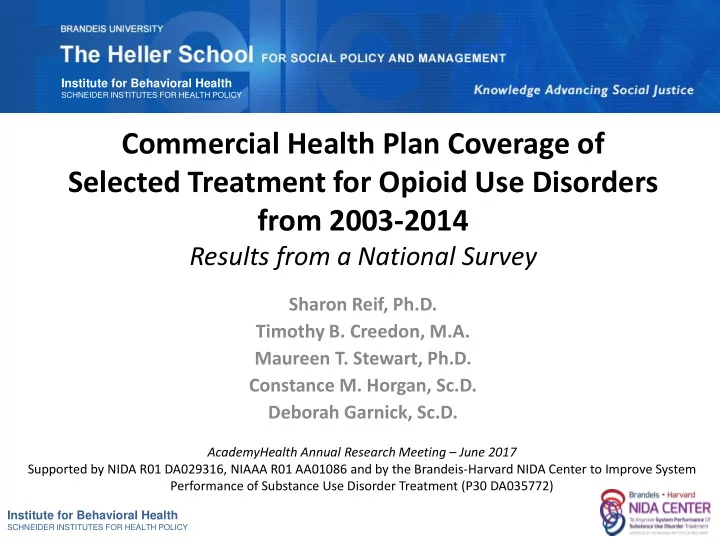

Institute for Behavioral Health SCHNEIDER INSTITUTES FOR HEALTH POLICY Commercial Health Plan Coverage of Selected Treatment for Opioid Use Disorders from 2003-2014 Results from a National Survey Sharon Reif, Ph.D. Timothy B. Creedon, M.A. Maureen T. Stewart, Ph.D. Constance M. Horgan, Sc.D. Deborah Garnick, Sc.D. AcademyHealth Annual Research Meeting – June 2017 Supported by NIDA R01 DA029316, NIAAA R01 AA01086 and by the Brandeis-Harvard NIDA Center to Improve System Performance of Substance Use Disorder Treatment (P30 DA035772) Institute for Behavioral Health SCHNEIDER INSTITUTES FOR HEALTH POLICY
Research questions • How has private insurance coverage of selected treatments for opioid use disorders (OUDs) changed over time? • How have private health plans approached prior authorization and continuing review? • Do health plans encourage use of pharmacotherapy for OUDs and if so, how? Institute for Behavioral Health 2 SCHNEIDER INSTITUTES FOR HEALTH POLICY
Study overview • Telephone survey of nationally representative sample of private health plans alcohol, drug, mental health services in 2003, 2010, 2014 • Response rates – 2003: 83% (N = 368 health plans, 808 products) – 2010: 89% (N = 351 health plans, 935 products) – 2014: 80% (N = 274 health plans, 705 products) • Survey administered by Mathematica Policy Research Institute for Behavioral Health 3 SCHNEIDER INSTITUTES FOR HEALTH POLICY
Research design • Sample frame of market-specific health plans • Panel design with replacement • Typically 2 respondents per health plan – Administrative component (Executive Director) – Clinical component (Medical Director) • Top 3 commercial products per health plan – Included top three non-marketplace commercial products (i.e., HMO, PPO, POS, CDP) • Weighted to be nationally representative and to account for complex survey design Institute for Behavioral Health 4 SCHNEIDER INSTITUTES FOR HEALTH POLICY
Research domains • Benefit design • Provider networks • Provider payment • Primary care integration • Entry into specialty alcohol, drug, and mental health treatment • HIV and disease management • Prescription drugs (2003, 2010) Institute for Behavioral Health 5 SCHNEIDER INSTITUTES FOR HEALTH POLICY
Types of treatment for OUDs • Methadone – Only in licensed Opioid Treatment Programs (OTPs) – Highly regulated – Considered a “service” in insurance benefit • Buprenorphine – “Office - based opioid treatment” (OBOT) – Also in OTPs – 60% offered buprenorphine in 2014 – Restricted to “waived” prescribers, patient caps – A medication covered under pharmacy benefit • Injectable Naltrexone – Sometimes a service, sometimes a medication in insurance benefit • Counseling – not included in this paper Institute for Behavioral Health 6 SCHNEIDER INSTITUTES FOR HEALTH POLICY
For this paper … • Opioid Treatment Programs – 2003, 2010, 2014 • Buprenorphine Pharmacy – 2003, 2010 • Opioid Pharmacotherapy – 2010 – For “encourage” questions Institute for Behavioral Health 7 SCHNEIDER INSTITUTES FOR HEALTH POLICY
Selected health plan approaches • Coverage • Time limits • Prior authorization • Continuing review • Encourage providers Institute for Behavioral Health 8 SCHNEIDER INSTITUTES FOR HEALTH POLICY
Health plan coverage, by year 100.0 97.0 100.0 Percent of Health Plan Products 80.0 70.0 69.0 2003 64.5 2010 60.0 2014 40.0 20.0 * - Opioid Buprenorphine Treatment Programs Pharmacy *Not asked in 2014 Institute for Behavioral Health 9 SCHNEIDER INSTITUTES FOR HEALTH POLICY
Change in coverage, 2003 to 2010 100% 35.6 80% Percent of Products 69.0 60% 32.8 40% 20% 28.9 31.0 0% - - 2003 2010 Neither Opioid Treatment Buprenorphine Both Program Only Pharmacy Only Institute for Behavioral Health 10 SCHNEIDER INSTITUTES FOR HEALTH POLICY
Methadone time limits, 2010 Other "Std Medical 6 months 1% Criteria" 1% 4% 3 months 1% None 93% Institute for Behavioral Health 11 SCHNEIDER INSTITUTES FOR HEALTH POLICY
Prior authorization required, if covered, by year 100.0 Percent of Health Plan Products 79.1 2003 74.3 80.0 2010 60.0 2014 38.1 36.5 40.0 20.0 7.9 * 0.0 Opioid Buprenorphine Treatment Programs Pharmacy *Not asked in 2014 Institute for Behavioral Health 12 SCHNEIDER INSTITUTES FOR HEALTH POLICY
Prior authorization for alcohol and opioid pharmacotherapy, if covered Acamprosate 2003 (Campral) 0% 2010 Naltrexone 0% (generic) 1% Naltrexone 2% (Revia) 33% Injectable Naltrexone (Vivitrol) 85% Buprenorphine 7% (Suboxone) 38% % of products Institute for Behavioral Health 13 SCHNEIDER INSTITUTES FOR HEALTH POLICY
Continuing review required, if covered, by year 100.0 Percent of Health Plan Products 83.7 2003 80.0 73.2 2010 60.0 2014 43.5 40.0 20.0 0.0 Opioid Buprenorphine * Treatment Programs Pharmacy *Not asked Institute for Behavioral Health 14 SCHNEIDER INSTITUTES FOR HEALTH POLICY
Did health plans encourage use of addiction pharmacotherapy, 2010 Alcohol dependence - 52% primary care Alcohol dependence - 86% specialty care Opiate dependence - 79% primary care Opiate dependence - 86% specialty care % of products Institute for Behavioral Health 15 SCHNEIDER INSTITUTES FOR HEALTH POLICY
Ways pharmacotherapy for OUDs is encouraged, by setting, 2010 Primary Care Specialty 99% 98% 71% 57% 54% 36% 32% 22% 3% 0% Provision of Feedback to Training Recognition Financial guidelines providers programs incentives % of products Institute for Behavioral Health 16 SCHNEIDER INSTITUTES FOR HEALTH POLICY
Summary • Treatment for OUDs covered by nearly all products in each year – Proportion of OTP and buprenorphine coverage varied • Rarely methadone time limits in 2010 • Prior authorization has decreased over time for OTPs, but increased for buprenorphine • Health plans actively encouraged pharmacotherapy in several ways in 2010 Institute for Behavioral Health 17 SCHNEIDER INSTITUTES FOR HEALTH POLICY
Implications • Health plan coverage is common, but other literature notes that treatment rates remain very low • Likely other barriers – Cost, geographical access, availability of waivered prescribers and OTPs • Improved health plan coverage for OUD treatment is necessary, but not sufficient Institute for Behavioral Health 18 SCHNEIDER INSTITUTES FOR HEALTH POLICY
Tha hank nk you ou, , ques uestions? tions? Sharon Reif, PhD; Senior Scientist, Institute for Behavioral Health, The Heller School, Brandeis University reif@brandeis.edu Institute for Behavioral Health 19 SCHNEIDER INSTITUTES FOR HEALTH POLICY
Recommend
More recommend